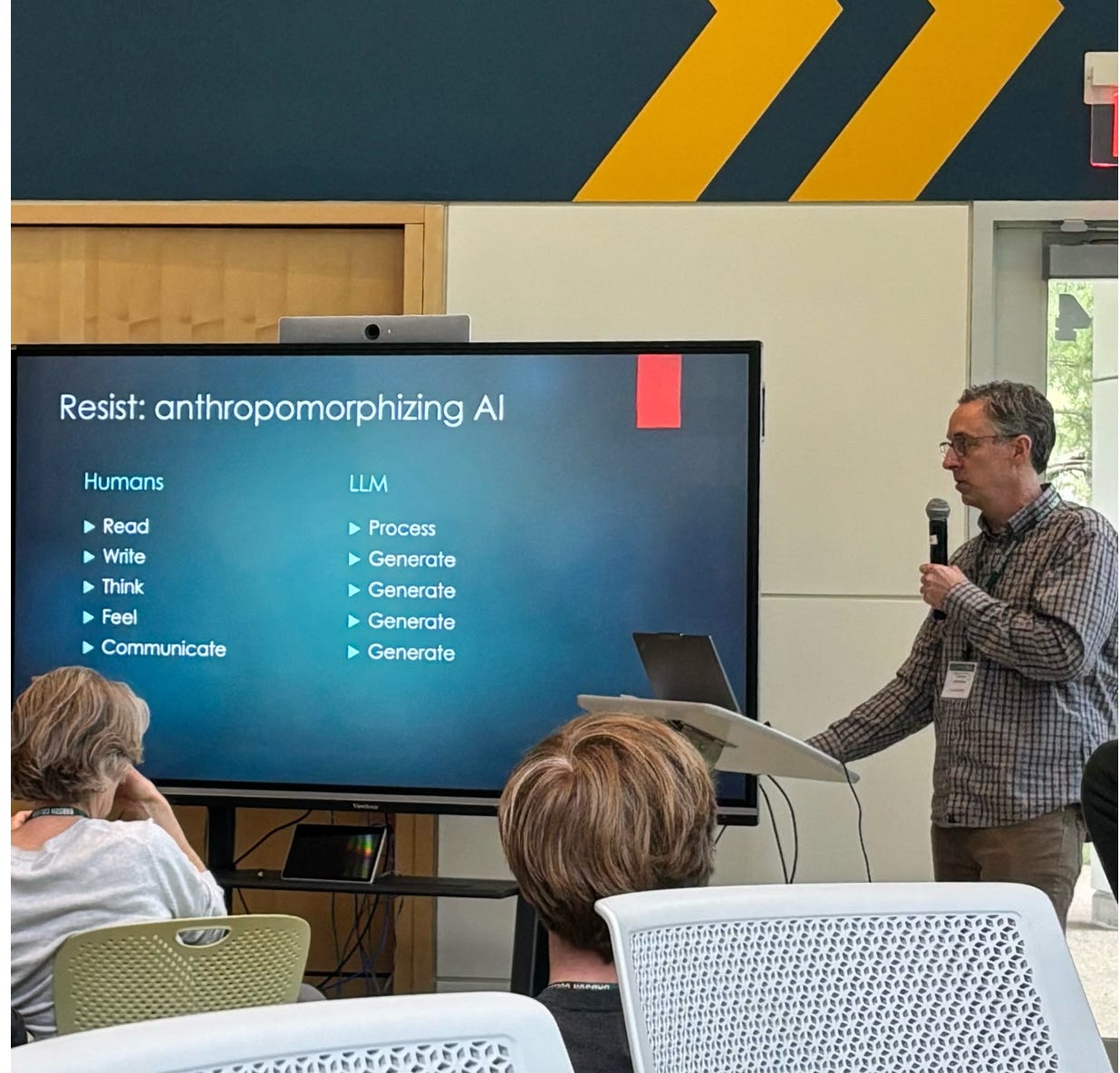The Important Work is a space for writing instructors at all levels—high school, college, and beyond—to share reflections about teaching writing in the era of generative AI. This summer, we’ve heard from a number of people who are attending conferences/professional development/other AI-related events. For the next few weeks, we’ll be sharing posts that reflect on those events—and the important work that happens between colleagues.
The first post in this series is by Kristi Girdharry, who is an associate teaching professor of English and director of the writing center at Babson College. Connect with her on LinkedIn.
If you’re interested in sharing a reflection for The Important Work, you can find all the information here. —Jane Rosenzweig
When I hosted the first “Babson Tea Party” in Fall 2024, I wasn’t trying to make a statement. I just wanted to get some writing folks in a room. As someone who has taught writing in some capacity for the last 15 years in the Boston area, I knew a number of local colleagues who were all grappling with generative AI from different roles, institutions, and perspectives. It was meant to be simple: a one-day symposium, hosted on my campus, with time for breakout conversations and a semi-structured agenda. We’d talk. We’d share. We’d learn.
And it worked.
It all started months before as a line in a spreadsheet under the question, “If your lab could do one big thing, what would it be?” The Generator, Babson College’s interdisciplinary AI lab, had some modest funding and wanted to support programming for each of its eight specialty labs. Glancing over my colleagues’ requests for student interns for research projects, payments for guest speakers, and even a robot choreographer, I wrote the following: “AI & Writing Symposium: one-day event to gather local Writing Program leaders for conversation, community, and support.”

I imagined maybe ten of us—though I secretly hoped for 20—gathered around a table. What happened instead was something more like a groundswell. By the time we met that November, over 30 institutions were represented—from community colleges to R1s to schools with very specific specializations. We shared food, questions, frustrations, jokes. I structured the day around a keynote speaker, working sessions, and a student panel, and I closed it with a casual reception and a lot of people saying, “When’s the next one?”
More specifically, the day started by bringing in an outside expert to speak to us about generative AI: Carl Quillen, a Principal Applied Scientist at Microsoft who works at their New England Research & Development (NERD) site, generously volunteered his time to give a talk that started more technical regarding the training of large language models and mathematical probabilities and ended more philosophically about tools and literature. From there, we moved into cross-institutional sharing: attendees had been assigned to specific tables to ensure a diversity of perspectives as they spoke about their contexts, AI initiatives, challenges, and successes.
After sharing at their tables, each group gave a 2-minute presentation that included 1-2 action items they’d be interested in pursuing over the next year. After breaking for lunch, participants reorganized themselves around tables topics that arose from the earlier report-outs. In our case, the topics were related to AI literacy, AI equity, and AI assignments and activities. The instructions were fairly simple:
Discuss your topic area
Determine what would be a desirable outcome
Make a plan! What would need to happen to lead to your outcome? What kinds of resources would you need? Which kinds of “personnel” would you need (other faculty, students, colleagues)? What kind of timeline would be feasible?
We heard report-outs from four groups (we broke the AI assignments and activities group into two tables), which gave us a great base of thinking from the perspective of faculty; however, what ended up being a very meaningful part of the day came next: a Babson student panel titled “How I really use AI…” We heard from eight students ranging from first-years (as in just months into their first semesters of college) to a recent alumna who graduated the previous spring and who was admittedly not super interested in AI until she realized it could help solve a problem near and dear to her.
The students spoke candidly about their experiences using AI for their schoolwork, business ventures, and everyday life. They answered participants’ questions and spoke openly about their enthusiasm for this “game changing” technology as well as how they were learning about it, which wasn’t necessarily in classrooms—though Babson, like other institutions, does have a growing number of courses tackling the topic. They were learning about generative AI through watching YouTube videos and experimenting on their own and with their peers. The lasting impression was that they didn’t want to cheat; they wanted to learn.
The day surfaced many things: fears and gaps, yes, but also unexpected ideas, joyful connections, and a collective sense of agency. We emphatically didn’t want our students only learning about AI from social media; in fact, we appreciated hearing that they wanted to learn from us. Someone left saying, “This made me excited to teach again.” Another reached out days later asking to bring this format to their campus. A few of us continued working on the most pressing issues of the day—on AI literacy, equity, and assignments—and were keen to keep talking. And so the Tea Party bore a sequel.
The second event, held in June 2025, deepened our work. We kept the roundtables and the snacks, but we also formalized a few things based on participant feedback: We invited John Warner (author of the recently published More Than Words: How to Think About Writing in the Age of AI and plenty of interesting InsideHigherEd and Substack posts) to deliver a closing keynote. We hosted sessions led by colleagues on AI literacy and equity, drawing directly from our earlier working groups. And we added a “speed share” of teaching practices where instructors from five different institutions walked us through real assignments and classroom activities in ten-minute bursts.

The AI literacy session, co-led by Maggie Boyd (Boston University) and Noël Ingram (Boston College), walked participants through a values-based approach to defining AI literacy (e.g., leading with values important to learning such as connection, collaboration, creativity, curiosity, respect). After thinking about their own top values as educators, participants discussed what AI literacy might look like through the lens of those values and crafted decision-making frameworks informed by that thinking.
The AI equity session, led by Joshua Botvin (University of Massachusetts – Dartmouth), focused on an ethics of care that emphasized open and honest discussions with students that allows for better understandings of their uses of the platforms as well as directly countering harmful existing practices in education, such as higher risks of plagiarism accusations against BIPOC students and the impacts that narrow views of Standardized Academic English can have on students.
Our speed-sharers gave us concrete examples from their own classrooms that opened up thinking for students and their AI use when it comes to everything from their own voices and identities to their research processes. Overall, through crowdsourcing presenters on predetermined topics, this second event felt more intentional but no less joyful. It still had that same underlying spirit: collaboration over reaction, experimentation over edict, community over isolation.
So when Jane launched The Important Work and asked us all to consider what that phrase meant, I thought of this: a room full of writing instructors who don’t all agree on the role of AI but who are willing to sit together, puzzle things out, listen generously, laugh at the absurdities, and build slow trust in fast times.
To be certain, there are plenty of flashy panels about AI out there. But the Babson Tea Parties—cheekily named as such given all the “revolutionary” discourse at the outset—aren’t those; they’re not even just about AI. They’re about teaching. And teaching is intellectual work—creative, emotional, improvisational, contextual, collective. The “important work” isn’t just about what we decide to do with AI in our classrooms; it’s about how we decide it and who we do that work with.
The Tea Party name and theme persisted beyond a cutesy nod to public chatter because the concept of a tea party came to represent so much more: it was low key on the spectrum of different types of events, low cost (zero cost for attendees), and truly focused on the humans at the tables who were just trying to figure it out and do best by their students (i.e., low-ego). And if there’s an opportunity to add a little fun and whimsy to an event, why not?
In all, these symposia are designed to honor the experiences of writing, including both the act of writing and the experience of teaching and learning it. That means respecting disciplinary knowledge even while acknowledging that no one has the full answer. It means making space for multiple approaches—AI integration, AI resistance, and everything in between. It means holding student voices in the room, not just as subjects of concern, but as experts in their own right.
That’s why the student panel from the first event remains one of the most talked-about elements. Hearing students explain how they use generative AI for everything from prototyping to accessibility to entrepreneurial ventures reminded us that the question isn’t just “what are they doing?” but “what can we learn from what they’re doing?” Their remarks had real impact. One attendee said they quote the students more than the keynote when talking with colleagues. Another said they left with a new assignment idea and a new attitude.
Hosting these Tea Parties has reminded me that creating space is itself an act of care. I’ve leaned into the theme—yes, we have decorations and party favors in addition to food and drink—but that’s because these events are about experience. And experience is at the heart of writing pedagogy. We don’t just teach texts; we teach people. We don’t just analyze genres; we co-construct them. We don’t just teach skills; we build relationships that in support of agency, curiosity, and voice.
So if you’ve been thinking about gathering folks at your own institution or across your region, consider this your invitation. You don’t need a massive budget or a keynote speaker (though those don’t hurt!). You just need a few people who care, a space that invites openness, and the courage to ask good questions in public. The rest will follow.
It doesn’t have to be fancy. It just has to be real. Because this, too, is the important work.
Image prompts
Initial Prompt: Create a sketch of the Boston tea party but instead of crates of tea, they are tossing AI-associated items like computers.
Initial Prompt, as suggested by ChatGPT (aka “meta-prompting”): An ornate Victorian keyhole in the center of the image, through which you glimpse a whimsical writing space: a vintage writing desk with floating pages and a softly glowing typewriter entwined with vines and tea cups. In the distant background, imaginative architecture and faint abstract patterns suggestive of data landscapes or algorithms. The composition should feel elegant, subtle, and playful — an invitation into a world where writing and AI intermingle. Style should be woodcut, engraving, or highly detailed vintage illustration with muted colors. The image should be designed for a presentation slide (landscape orientation).






I feel fortunate to have attended both of the Babson "tea parties" and was I was very happy to be able to publish this right now, when so much attention is being given to the $$ partnership between AI companies and NYC schools. What happened at Babson, what is happening in this newsletter, and what I hope is happening widely: conversations about teaching between teachers, about the best way to do the important work and to do what's best for our students.
Loved this reflection, thanks for sharing. Wish I wasn't on the other side of the country as y'all sound like my people!